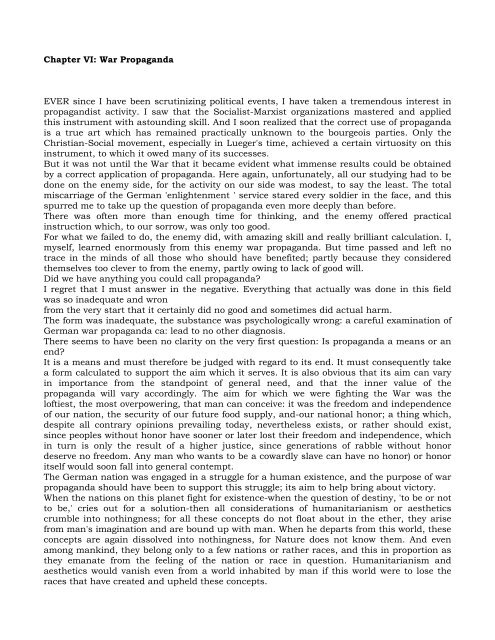Mein Kampf by Adolf Hitler
Mein Kampf by Adolf Hitler
Mein Kampf by Adolf Hitler
- TAGS
- kampf
- adolf
- hitler
- stuff2share.com
Create successful ePaper yourself
Turn your PDF publications into a flip-book with our unique Google optimized e-Paper software.
Chapter VI: War Propaganda<br />
EVER since I have been scrutinizing political events, I have taken a tremendous interest in<br />
propagandist activity. I saw that the Socialist-Marxist organizations mastered and applied<br />
this instrument with astounding skill. And I soon realized that the correct use of propaganda<br />
is a true art which has remained practically unknown to the bourgeois parties. Only the<br />
Christian-Social movement, especially in Lueger's time, achieved a certain virtuosity on this<br />
instrument, to which it owed many of its successes.<br />
But it was not until the War that it became evident what immense results could be obtained<br />
<strong>by</strong> a correct application of propaganda. Here again, unfortunately, all our studying had to be<br />
done on the enemy side, for the activity on our side was modest, to say the least. The total<br />
miscarriage of the German 'enlightenment ' service stared every soldier in the face, and this<br />
spurred me to take up the question of propaganda even more deeply than before.<br />
There was often more than enough time for thinking, and the enemy offered practical<br />
instruction which, to our sorrow, was only too good.<br />
For what we failed to do, the enemy did, with amazing skill and really brilliant calculation. I,<br />
myself, learned enormously from this enemy war propaganda. But time passed and left no<br />
trace in the minds of all those who should have benefited; partly because they considered<br />
themselves too clever to from the enemy, partly owing to lack of good will.<br />
Did we have anything you could call propaganda?<br />
I regret that I must answer in the negative. Everything that actually was done in this field<br />
was so inadequate and wron<br />
from the very start that it certainly did no good and sometimes did actual harm.<br />
The form was inadequate, the substance was psychologically wrong: a careful examination of<br />
German war propaganda ca: lead to no other diagnosis.<br />
There seems to have been no clarity on the very first question: Is propaganda a means or an<br />
end?<br />
It is a means and must therefore be judged with regard to its end. It must consequently take<br />
a form calculated to support the aim which it serves. It is also obvious that its aim can vary<br />
in importance from the standpoint of general need, and that the inner value of the<br />
propaganda will vary accordingly. The aim for which we were fighting the War was the<br />
loftiest, the most overpowering, that man can conceive: it was the freedom and independence<br />
of our nation, the security of our future food supply, and-our national honor; a thing which,<br />
despite all contrary opinions prevailing today, nevertheless exists, or rather should exist,<br />
since peoples without honor have sooner or later lost their freedom and independence, which<br />
in turn is only the result of a higher justice, since generations of rabble without honor<br />
deserve no freedom. Any man who wants to be a cowardly slave can have no honor) or honor<br />
itself would soon fall into general contempt.<br />
The German nation was engaged in a struggle for a human existence, and the purpose of war<br />
propaganda should have been to support this struggle; its aim to help bring about victory.<br />
When the nations on this planet fight for existence-when the question of destiny, 'to be or not<br />
to be,' cries out for a solution-then all considerations of humanitarianism or aesthetics<br />
crumble into nothingness; for all these concepts do not float about in the ether, they arise<br />
from man's imagination and are bound up with man. When he departs from this world, these<br />
concepts are again dissolved into nothingness, for Nature does not know them. And even<br />
among mankind, they belong only to a few nations or rather races, and this in proportion as<br />
they emanate from the feeling of the nation or race in question. Humanitarianism and<br />
aesthetics would vanish even from a world inhabited <strong>by</strong> man if this world were to lose the<br />
races that have created and upheld these concepts.


